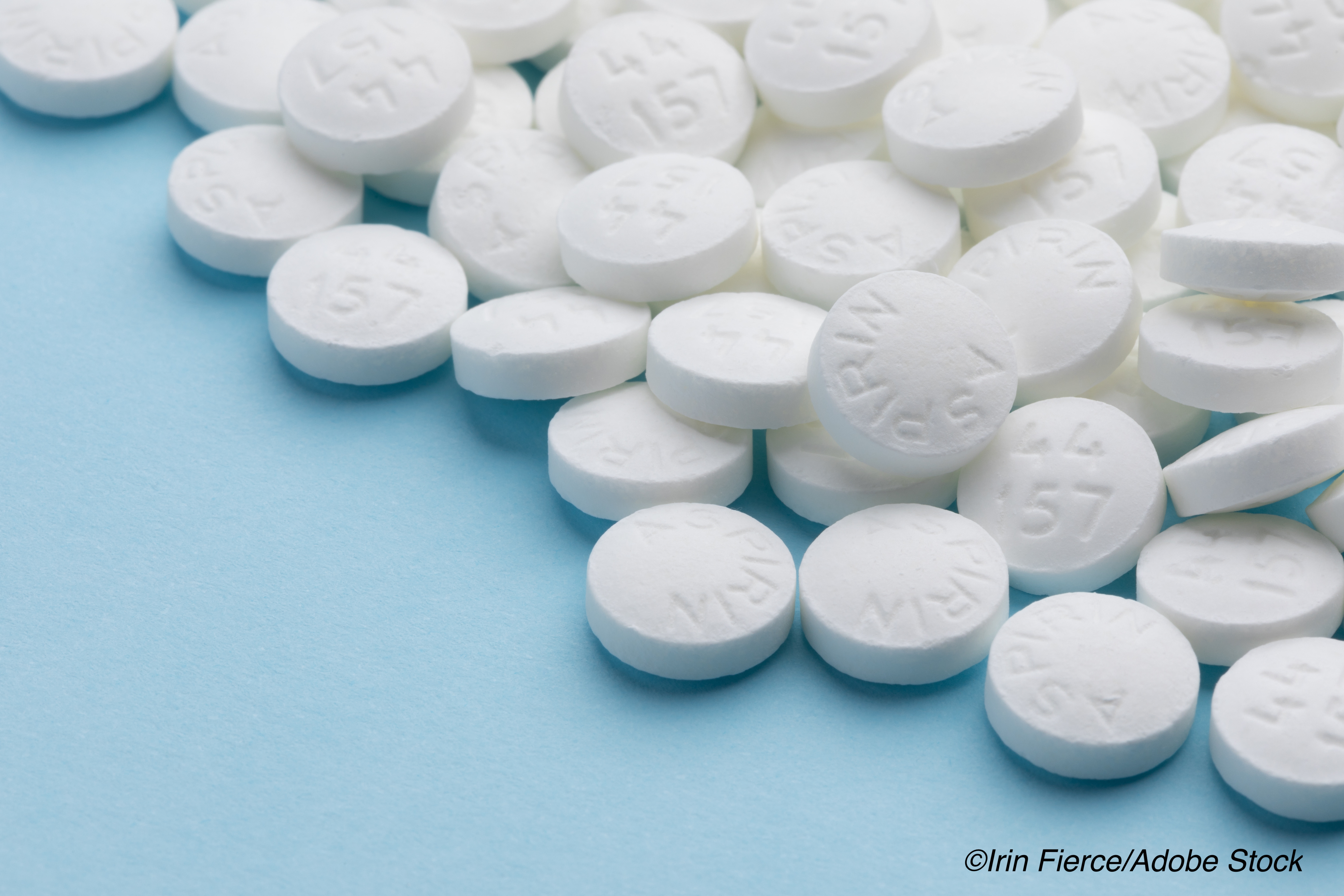
Which daily aspirin dose (81 mg or 325 mg) is more effective at preventing cardiovascular death, myocardial infarction (MI), and/or stroke in persons with cardiovascular disease? For those who were eagerly awaiting the answer to this question, there is now an answer: Neither.
Turns out that aspirin at either dose reduces the risk of ischemic events.
But what about safety? Which dose is more likely to increase bleeding risk?
Here again, no favorite emerged in the 15,000 patient ADAPTIVE trial, the findings of which were presented in the opening late-breaking clinical trials session at the American College of Cardiology’s ACC.21 virtual meeting and simultaneously published online by The New England Journal of Medicine.
One factor at play in those results was human nature—41.6% of the participants assigned to the 325-mg dose simply decided to switch to the 81-mg, while just 7.1% of those assigned to the 81-mg dose switched to the higher dose. Why?
As W. Schuyler Jones, MD, assistant professor of medicine at the Duke Clinical Research Institute and lead author of the ADAPTIVE trial explained, it was an open-label trial, so all participants knew the dose to which they had been assigned from the outset, and at baseline 96% of the participants were taking aspirin and almost all of them (85.3%) were taking low-dose aspirin.
“Some participants may have switched from high to low-dose for tolerability, but it is also likely that other factors influenced the decision,” Jones said. He noted that the 2016 ACC/AHA Guideline Focused Update on Duration of Dual Antiplatelet Therapy in Patients With Coronary Artery Disease: A Report of the American College of Cardiology/American Heart Association Task Force on Clinical Practice Guidelines recommended the 81-mg dose.
“We made every effort to encourage them to stay on their study dose, but nevertheless, people felt very strongly about it, so the differential effects of the two doses are less clear since dose switching occurred very frequently, especially in the 325-mg group,” Jones said. And those efforts were not entirely unsuccessful since there were many patients who stayed on the assigned dose for more than a year.
The ADAPTIVE trial recruited 15,076 patients and followed them for a median of 26.2 months beginning in April 2016. Patients were followed every three or six months. The median age of patients was 68 and most (68.7%) were men. “At baseline, 35.3% of the patients had previous myocardial infarction and 53.0% had previous coronary revascularization procedures within five years before enrollment.”
Among the findings:
- The composite endpoint of death from any cause and hospitalizations for MI or stroke occurred in 7.28% of those in the 81-mg group versus 7.51% of those in the 325-mg group (HR 1.02; 95% CI 0.91-1.14).
- Death from any cause occurred in 3.80% of those in the low-dose arm versus 4.43% of those in the 325-mg arm (HR 0.87; 95% CI 0.75-1.01).
- Hospitalization for MI or stroke “were similar in the two groups.”
- Hospitalizaiton for major bleeding with associated transfusion occurred in 0.63% of those in the 81-mg group and 0.60% of those in the 325-mg group (HR 1.18; 95% CI 0.79-1.77).
- Fewer patients in the 81-mg group (7.0%) discontinued aspirin use than in the 325-mg group (11.1%).
Donald M. Lloyd-Jones, MD, ScM, chair of preventive medicine at Northwestern University Feinberg School of Medicine in Chicago, who was a discussant following Jones’ presentation, noted that although bleeding events were low in both arms, in the intention-to-treat analysis events were slightly lower in the 325-mg arm, “which I found surprising.”
Lloyd-Jones asked Jones if he and his colleagues had conducted a sensitivity analysis per protocol for the 325-mg dose and, if so, if they had a hypothesis that might explain what appeared to be a counterintuitive result.
Jones said such analyses are ongoing.
In an editorial that accompanied the NEJM publication, Colin Baigent, FMedSci, of the Medical Research Council Population Health Research Unit, University of Oxford, Oxford, United Kingdom, said ADAPTABLE has valuable lessons for other researchers.
“The ADAPTABLE experience is a reminder of the importance of certain fundamentals when designing and conducting randomized trials: comparability between treatment groups, good adherence to assigned treatment, complete ascertainment of outcomes, and unbiased statistical analysis are all essential,” he wrote. “But when planning a new trial, it can often be difficult to predict where problems will arise. Moreover, because of the unwieldy nature of such trials, and the fact that investigators are generally unaware of the trial-group assignments, it can be difficult to recognize and fix problems before trial completion. For this reason, it is often prudent for a pilot study to be incorporated into planning for a major trial. Investigators can plan to review unblinded data from a pilot study, including data on treatment adherence, and this then provides an opportunity for changes to the design of the trial before the main phase begins.”
And, even though the trial failed to identify a superior dose based on efficacy and safety, the study was “a major achievement, however, because it has shown a method of conducting trials efficiently and at low cost in the United States, and the method can now be adapted and used more widely. This should allow many more clinical questions to be answered, with obvious benefits to health care consumers,” he added.
So what, then are the take-home messages from this trial?
Jones said clinicians can offer some simple guidance to patients: “If you are taking aspirin now, staying on the dose you are currently using, either 81-mg or 325-mg, is probably the right course to follow. If you are resuming aspirin, starting a low-dose is probably the right choice since it may be more tolerable and the trial didn’t find conclusive evidence that a higher dose is better.”
-
Findings from a study of more than 15,000 CVD patients confirmed the efficacy of aspirin for secondary prevention of ischemic events but failed to identify an optimal dose.
-
At either 81-mg or 325-mg daily, aspirin did not significantly increase bleeding events.
Peggy Peck, Editor-in-Chief, BreakingMED™
Jones reported grants from Patient-Centered Outcomes Research Institute during the conduct of the study; grants from Boehringer Ingelheim, grants and personal fees from Bayer, grants and personal fees from Janssen Pharmaceuticals, personal fees from Bristol-Myers Squibb, grants from Merck, personal fees from Medscape, outside the submitted work.
Baigent reported grants from Boehringer Ingelheim, grants from Medical Research Council, grants from British Heart Foundation, grants from NIHR, outside the submitted work.
Cat ID: 103
Topic ID: 74,103,730,103,308,358,5,914,192,925,168


